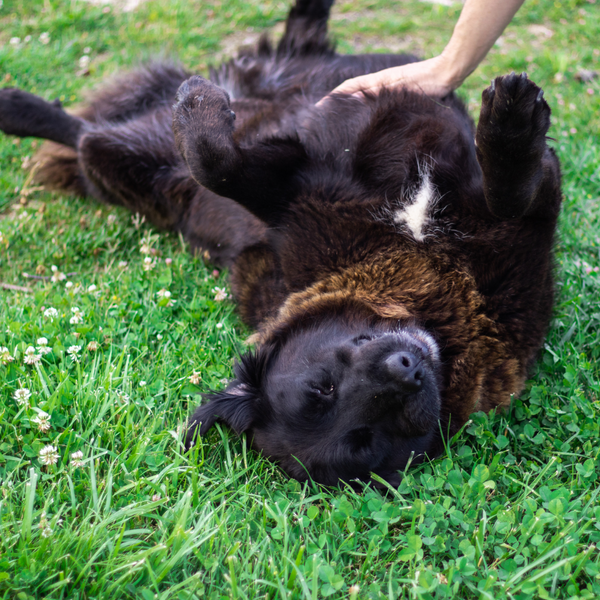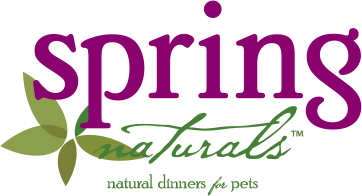
Probiotics vs. Prebiotics for Cats and Dogs
(Dr. Iulia Miha, DVM) For various gastrointestinal disorders in cats and dogs, prebiotics and probiotics are popular treatments. Both prebiotics and probiotics help support your pet's overall health.
But what are prebiotics and probiotics? What exactly do they help with?
What Are Probiotics?
The word "probiotic" is a combination of the words "pro" (for/to promote) and "biotic" (which comes from the word "bio", which means life).
In short, probiotics are good bacteria that promote the health of the digestive tract of animals and humans. There are different types of probiotics that have positive effects on your pet’s body. Probiotics are often the same good bacteria that live naturally in the digestive tract of animals.
A large category of prebiotics is represented by Bifidobacteria which help digest fiber and carbohydrates. Bifidobacteria have been linked to reducing the risk of heart disease as they are involved in the fiber digestion process. Some of these bacteria are called:
- Bifidobacterium animalis
- Bifidobacterium breve
- Bifidobacterium lactis
Another group of probiotics is Lactobacillus, which is a type of bacteria that helps to break down sugars found in milk (lactose). There are many types and subtypes of this group, each with unique characteristics and roles. Some bacteria in this group are:
- Lactobacillus acidophilus
- Lactobacillus casei
- Enterococcus faecium
Lactobacillus acidophilus and Bifidobacterium animalis are two strains of good bacteria that are frequently recommended by veterinarians for pets suffering from diarrhea or loose stools. Probiotics are good for a balanced microbiome and help to improve digestion. They also help to maintain the health of the skin and fur, improve mood, and reduce bad breath.
What Is the Microbiome?
According to experts, the microbiome is the name of the community of bacteria in the digestive system. However, the microbiome plays several other important roles than just being the healthy bacteria attached to the intestinal flora. For example, in the case of humans, scientific evidence suggests that the microbiome is responsible for various changes in the body that lead to obesity. The microbiome is also responsible for significant immunological, neuronal, and endocrine changes.
The microbiome contributes to the synthesis of vitamins and nutrients, modulating the nervous system (hence its reference as the "second brain") and protecting the body from pathogens. The microbiome also plays a significant role in supporting the immune system.
Microbiome Imbalances: What Is Dysbiosis?
Dysbiosis occurs when there are imbalances in the microbiome. The pathogenic organisms end up suffocating the good bacteria and the imbalance then occurs.
Imbalances in pets can be caused by factors such as a diet rich in grains, processed foods, stress, or medications such as NSAIDs, antibiotics, or corticosteroids.
Dysbiosis leads to gastrointestinal symptoms. Depending on the location of the dysbiosis (stomach, small intestine, or colon) and the degree of damage to the microbiome, clinical signs can be mild or severe and can include:
- Vomiting
- Diarrhea
- Loss of appetite
- Weight loss
In this case, probiotics can restore the good bacteria of the gastrointestinal tract and help improve the clinical signs. Each group of probiotics has different effects on the body. As a result, they must be chosen according to the desired objectives.
In addition to probiotics, the vet can recommend an easily digestible diet and prebiotics to your cat or dog.
What Are Prebiotics?
Prebiotics are fiber molecules that feed the healthy probiotic colonies in the microbiome. Specifically, prebiotics are soluble fiber sourced from plants that are used as food by the colonies present in the microbiome. Many of the benefits of prebiotics can be found in foods rich in soluble fiber.
The most common prebiotics are inulin, a soluble fiber (a form of carbohydrate) that occurs naturally in plant roots, and Psyllium, a soluble fiber derived from the husks of the psyllium seed.
Inulin as a Prebiotic
One of the main benefits of inulin is that it crosses the digestive tract intact until it reaches the colon as it resists digestive enzymes. In the colon, inulin is broken down through a fermentation process and becomes a food source for the microbiome. This fermentation process can create discomfort for your pet due to the gas it creates. Inulin can also lead to other side effects.
Side Effects of Inulin on Dogs and Cats
Stomach Growling
If you've decided to give your pet inulin supplements or your veterinarian has prescribed it, don't be alarmed if you hear your pet's stomach growling from the other room (especially in dogs). Because of its high fiber content, inulin can lead to this discomfort. However, the noises should disappear over time as your four-legged organism gets used to this prebiotic.
Flatulence
As mentioned before, inulin breaks down in the colon through a fermentation process. This process leads to bloating and flatulence. The foul-smelling gas that is created can last several hours until the pet recovers. As in the case of stomach growling, once your pet's body gets used to these supplements, the accumulation of gas in the intestine will resolve.
Abdominal Cramps
Abdominal cramps occur due to the high fiber content of inulin. As your cat or dog gets used to this supplement, the pain will disappear. This side effect can occur as a result of taking too much inulin. If this clinical sign does not resolve after a few administrations, talk to your veterinarian.
Burping
As in the case of flatulence, burping is the result of the fermentation process. So if your pet burps after taking inulin, there is no need to worry. As with the other side effects, burping will resolve on its own after a few administrations.
Diarrhea
If the dose of inulin is not suitable for the size of your pet, soft stools or diarrhea may occur. If diarrhea occurs, you must contact your veterinarian to adjust the inulin dose of your pet.
Psyllium as a Prebiotic
Psyllium is a soluble fiber that is beneficial for many conditions in animals and humans. It is especially beneficial for:
- Irritable bowel syndrome
- Diarrhea
- Constipation
- Other digestion issues
Unlike inulin, psyllium has fewer side effects because it does not ferment in the large intestine.
How Long Should Prebiotics and Probiotics Be Given to Pets?
The duration of administration of prebiotics and probiotics depends on the objectives. For example, if your dog suffers from diarrhea, these supplements should be administered for 5-14 days depending on the severity. The same applies if your pet is constipated.
If your cat suffers from an inflammatory bowel disease (IBD), the treatment with prebiotics and probiotics will last several weeks. In any case, monitor the clinical signs and the evolution of your pet's condition and talk to your veterinarian whenever necessary.
Conclusion
Prebiotics and probiotics are two different supplements that have a common goal: promoting the health of the digestive tract. Probiotics are colonies of good bacteria that help to repopulate the intestinal flora and prebiotics are fiber molecules that feed the healthy probiotic colonies in the microbiome. Both can help your pet with various gastrointestinal disorders and can help maintain a healthy microbiome.
Dr. Iuliana Mihai, DVM, Masters In Small Animals And Equines Pathology
Iuliana graduated from the University of Agronomical Sciences and Veterinary Medicine in 2012, Romania. She has a Master’s degree in Small Animal and Equines Pathology and a strong affinity for Veterinary Parasitology and Laboratory. In 2013 she started her Ph.D. in epithelial cancer in dogs and cats. She volunteered at the faculty’s clinic in her 3rd year of study, and continued her career in small animal pathology and laboratory. She has one cat and eleven rats. Her interests outside of work include traveling, writing, and crafting.

Post a Comment!